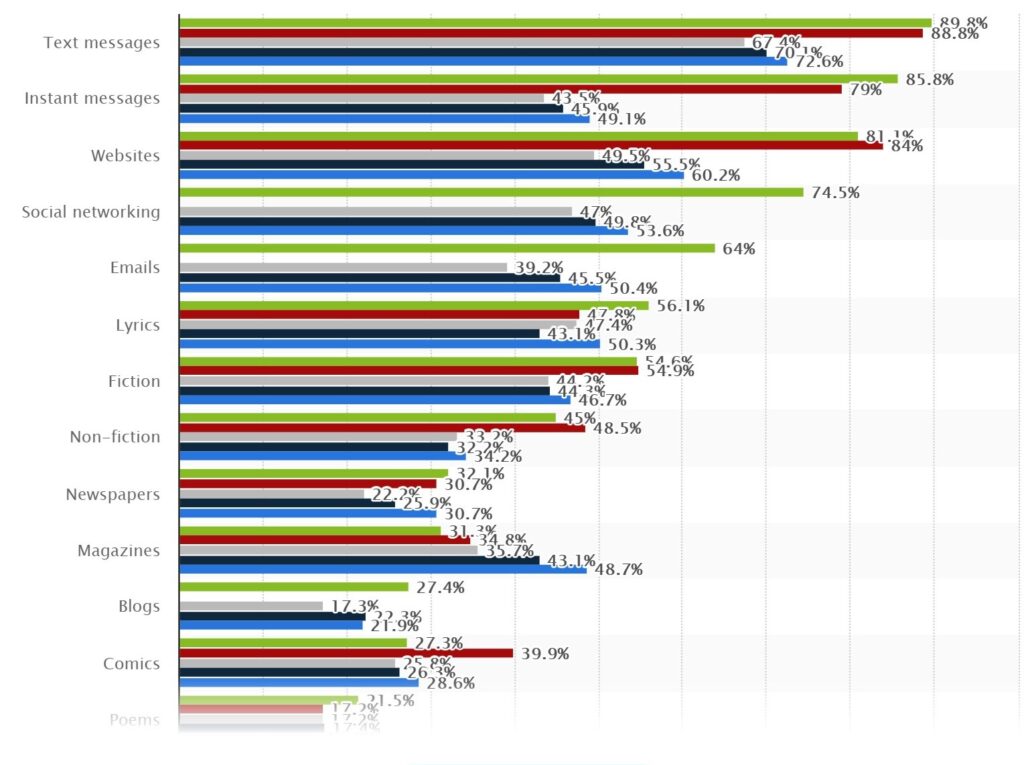Are children and teens really struggling to communicate with everyone else in the world? Or could this be down to them reading less than they used to? It certainly appears so. Studies show that less than 20% of teens in the United States read for pleasure. In the UK, this figure rises to about 30%. Problem is though, that the vast majority of reading – in both countries – tends to be focused on digital and short, low-quality texts. What is missing here is the rich, deep interaction with writings and with other family members when doing so.
Take a quick look at how much time young people spend reading the different types of media nowadays in the chart below:

What exactly are our kids reading every day? (green bars represent 2019 stats) On top of this, we can all testify that our kids – especially boys – spend more and more time on gaming, with texting, social media and online browsing being ever-popular with all genders. Of course, it’s hard to get your child or teen to curl up with a good book for hours — there’s just so many other fun things to do. But you might be pleased to hear that the benefits of reading just 20 minutes a day have been proven by research and it can be summarised in the following powerful points. Some of these practices line up with our other recommendations to help writing, but for now, the emphasis is reconnecting through reading, in just 20 quality minutes a day:
1. Early reading skills can affect children’s academic success
Reading 20 minutes a day exposes kids to a vast quantity of words (1.8 million in each school year, actually!). And this exposure makes children more likely to score in the 90th percentile on standardized tests. If you compare this to children who read just 5 minutes per day — and are therefore more likely to score in the 50th percentile — it’s easy to see how reading time translates to academic success. Meanwhile, a separate study involving almost 10 million students showed only those reading at least 15 minutes a day achieved accelerated reading gains. And those reading less were at risk of falling behind their peers. If you’ve been unsure of the benefits of reading 20 minutes a day, these statistics should help clear any confusion up! See our essential reading for every child (and adult!)
2. Reading often helps to improve writing skills
Following on from our previous point, if there’s vocabulary benefits associated with reading 20 minutes a day, then writing benefits are there for the taking, too. Essentially, the more words your kid reads, the wider their vocabulary is likely to be. And a wide vocabulary makes a kid’s writing more interesting and impressive. They’ll discover new ways to convey meaning, articulate their thoughts, persuade people, use figurative language, and engage readers’ emotions. This can help them become stronger writers, whether working on a short story age 10, an essay age 13, or a college application letter age 17. Children who rarely read are less likely to expand their linguistic know-how in the same way. And that could hold their writing back significantly.
3. Reading stimulates and enhances children’s imaginations
Recent research shows that the imagination may be more powerful than believed previously — scientists now believe that creative imaging can ‘rewrite’ certain memories to be less traumatic, and can even enhance certain physical connections within the body. For example, imagining playing a piano could “boost neuronal connections in regions related to the fingers”. So developing a strong imagination could help people to exercise greater control over their thoughts, memories, and more. This is something we can understand and connect the dots, when we look at both facts and reality – reading daily can help to strengthen a child’s imagination, introducing them to concepts, cultures, and possibilities beyond their own life experience. They can learn about the world, stimulate their curiosity, and give them a better understanding of other people’s lives. And with the imagination being such a powerful force, there’s so much to gain from that alone!
4. Fiction stimulates creativity in children
So from imagination to creativity — two related, but still quite different strengths for kids who read 20 minutes a day. Getting lost in a fictional world helps kids to expand their own creativity, as they’ll experience situations, worlds, characters, thoughts, and feeling that they may not have come across in their own lives just yet. What’s more, by reading they’ll realize that people can make a living from writing books, magazines, and newspapers. This may inspire them to explore their own creativity and inform their career choices in the future.
5. A good book encourages children to relax at bedtime

Kids, no matter their age, have a lot going on in their lives. They’re constantly learning, and changes like the transition from school to school can be stressful for most. The good news is, either reading with your child — or allowing them to read independently at bedtime — can help them to relax and wind down from their day.
Research by the UK National Literacy Trust (NLT) found that 90% of children feel “happiest” when reading and writing, as opposed to playing games or watching favourite cartoons. That might sound a little unbelievable if your kid is more often glued to their screen, than with their nose in a book, but maybe a little nudge in the right direction is all they need!
6. Regularly reading helps kids develop empathy
Studies show that reading can help children to develop empathy, by challenging them to consider how other people (the characters) may think or feel. This builds social skills and helps them interact better with people around them – also helping them, forge priceless skills needed for the world of work, later on. You can give them a casual boost at school or home, too.
Parents and teachers can help support this empathy development by asking different types of question to get them thinking in parallel, and also opening their minds to different possibilities of understanding between individuals. Questions such as: “Why do you think Alex Rider did what he did on this page?” “What could you say to make the Big Friendly Giant feel better about himself?” “How would you feel if you were far from home, like Dorothy in The Wizard of Oz? And what do you think the Yellow Brick Road really means? Could it be a metaphor based on the colour?”
Learning to approach situations and consider the feelings of others could help children of all ages to be more compassionate in life, and more successful in all endeavours – if they can just connect with those around them. Of course, it all starts at home, so the better they connect with us and learn from us, as parents…the better they will fare out in the wild.
In conclusion
Young children, pre-teens, and teens can all reap a number of benefits from reading 20 minutes a day — whether that’s helping them learn about the world around them, increasing their academic performance, discovering their own untapped creative potential, or just hanging out, spending quality time and enjoying a great book! So what are you waiting for? Why not head down to the library or bookshop together – or browse through Amazon if need be – Pick out a few new titles, and get to work on setting a new, family habit — together.
If you want to learn more about the benefits of reading and how to make the most of these activities, or if you have questions on anything related to to the world of education, feel free to get in touch. We’d be happy to help!






